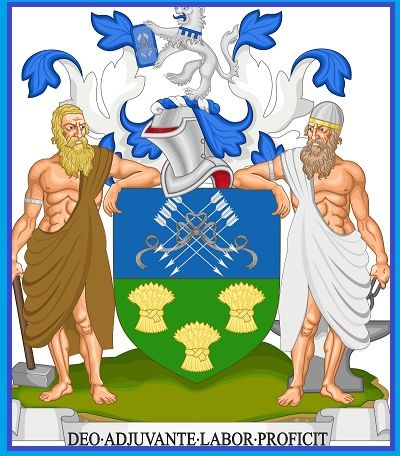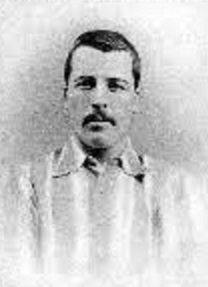
Sheffield -
more on the Story of Football Love/Hate, Freefall Certainly and Aided Resurrection
In other pieces on this site, in the light of the city's current claim to be "The Home" and not a home of the game, the role of Sheffield in the origin of Association football has been discussed in depth. In one the characters involved in its life-saving input in the 1860s have been recognised and praised, as has the rescue itself. In another the new personalities and their roles in what has to be seen as something of an 1870s implosion and then that in the 1880s of the Cleggs' in arresting and reversing the drift has been picked over in some detail not done elsewhere. And in a third piece the plain facts of club formation over the almost two and half generations from 1857 in Sheffield and in the other parts of England were spotlighted and directly compared with the same particularly from 1872 in Scotland as we contend our football and players fully took the game over and carried it forward. So now in a final piece, again with the baton of Scottish replacement of Sheffield in hand, we specifically look at direct result-comparison, at Sheffield's then seeming disengagement and the full nature of its 1890s comeback.
Today Sheffield football, at least in its top level echelon is in turmoil. Wednesday has been for some time one of the barely walking wounded of the English Football pyramid and both it and United, on writing, prop up the Championship South of the Border. Nor is it the first time that it has found itself in a similar position. One hundred and fifty years ago it was teetering on a similar cliff and once again one of its own making.
Yet the Yorkshire city has the oldest acknowledged and surviving football club in the World, the oldest derby match that is still played and, we reiterate, its contribution of sensible laws to our the modern game, albeit from without, is second-to-none. And It should, we repeat, also be recognised that without the morale support in the 1860s of Sheffield Rules football the London Rules game, the one that still forms the core of what we play today, might not have survived. Be clear, in 1866 our game was within one vote of turning off its own life-support and it was the guardians of the Steel City variant, who seem to have been pivotal in the switch not being thrown, who then, with the Youdan Cup, provided the template for the FA Cup, having already introduced the inter-city game and to facilitate their Southern brothers agreeing to play either to its own code and London's as circumstances required.
Moreover, in Scottish terms, with the coming in 1872 of Association football to Scotland, it was already by 1874 that Sheffield accepted to play city-on-city, North of the Border and by 1876 that a first Sheffield club did so club-to-club. The first inter-city encounter was in Yorkshire and a 2-2 draw with Glasgow, the initial inter-club ones when Clydesdale met Sheffield Wednesday, winning 2-0 and Alexandra Athletic would beat Sheffield Albion 1-0, both in Glasgow.
But that for Sheffield for the remainder of the decade was to be the limit of success. As each city took turnabout to host, Glasgow won every meeting, thirteen goals scored to three, the 1875 win probably the trigger for Peter Andrews to be "invited" to move South and the one in 1876 prompting a similar one for James "Reddie" Lang. And this was as in 1877 and 1879 Third Lanark first drew with and then beat Andrew's Sheffield Heeley, whilst in 1878 Alexandra Athletic was once more victorious away over Sheffield Albion and at home Lang's Wednesday lost to Rangers. In all it was ten goals to three.
Moreover, as the 1870s became the 1880s, in fact until 1888 Sheffield would win just one Glasgow game in nine, in 1884 at home. Its only real successes would be in the four seasons from 1880, when it faced Edinburgh for the first time, lost but then won two of the remaining three encounters so 50%. And at club level it would be much the same as far as it went. In 1880-1 and 1881-2 six matches took place. The Scots teams won the first five and lost the last but with an overall goal difference over the piece of twenty-six to two.
But with that it changed. Sheffield clubs simply disengaged for the foreseeable with one exception in 1886 and even then with a proviso. A team from the city did travel north for two games, a 3-1 defeat by St. Johnstone and a 16-1 gubbing by Dumbarton but it was Sheffield Caledonian, of which there is no other mention but must be assumed to be the city's own Scots club. Sheffield's Caledonian Society has existed since 1822. It seems unlikely that in the 1880s, as everywhere almost globally, a football club would not have emerged from its membership.
Yet all was not quite lost. In 1882 a first ever Sheffield club had reached the FA Cup semi-final. It was The Wednesday, Sheffield Wednesday. Then in 1890, albeit after a very noticeable gap of eight seasons, the same club was to go one stage further but only to lose very heavily in the final to Blackburn Rovers. Moreover, four seasons later the pattern was repeated. In 1894 Wednesday reached the semi-final, this time to be defeated by Bolton Wanderers. And, there was better to come in still shorter time. In 1896 the penultimate hurdle was cleared, and with ultimate success. Wolves were beaten 2-1 in the Final but again victory came with a proviso. Six years earlier the losing team had been all English, although hardly Sheffield at all. This time in victory it was with five of the eleven - Brandon, Petrie, Brash, Brady and Bell - all Scots.
Furthermore, the Wednesday success was soon to be replicated, this time by the city's new and rising team, Sheffield United.It had only been formed in 1889 with Charles Clegg as its initial president. It entered the FA Cup for the first time the following year only to be beaten in the Second Round 13-0 and by Bolton. And the pattern of early exit would continue to 1897-8 but in 1898-9 that would all change. Wednesday would lose in the First Round. United would trounce Derby in the final, 4-1.
But that was not all. Additionally, The Blades had joined the Football League in 1892, been promoted at the end of the season, wobbled slightly but by the end of 1896-7 had finished second to Aston Villa and in 1898 as champion and eligible in turn for a "Champion of Great Britain" clash with the Scottish league winner. That club was Celtic.
The match, or rather the matches home and away, took place in April. United won 1-0 at Bramhall Lane, drew 1-1 at Celtic Park and thus found itself, with the Cup-wins still to come, at the peak of the global game. Furthermore, unlike Wednesday it would achieve all with teams that were ten elevenths English, the only exception for the League-triumph being a single Scot, Bob Cain, at full-back and for its Cup successes no Scots, his replacement being Irish-born Peter Boyle. But here there are two caveats, the first that the Cup-run would almost cost it its league-status. United finished sixteenth of eighteen. The only consolation was perhaps that Wednesday was relegated. The second was Boyle was not exactly what he seemed. Although in all he would play for Ireland five times as a boy he had moved across the water with his family. In fact he had been raised and learned the game in Coatbridge, recruited to Steel City from Sunderland but via the town's Albion Rovers. So it was that even as resurrection was complete, with the Cup defeat in 1900 to Tottenham and a second and last Cup victory in 1901 as icing on the cake, one way or another Scotland had still been there or thereabouts.
Back to the SFHG Home page
